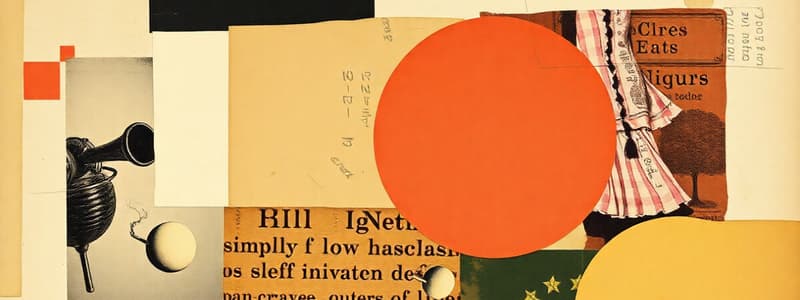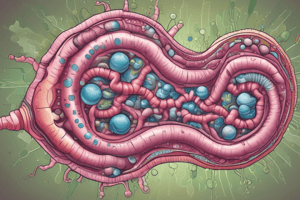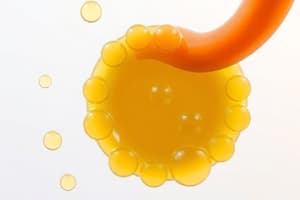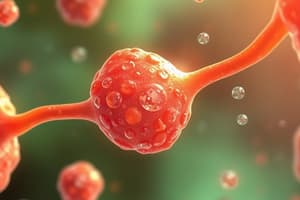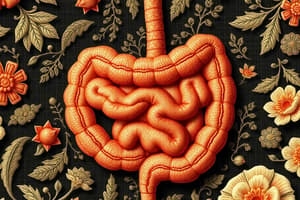Podcast
Questions and Answers
What is the primary type of lipid consumed in the diet?
What is the primary type of lipid consumed in the diet?
- Phospholipids
- Triglycerides (correct)
- Essential fatty acids
- Cholesterol esters
What is the role of bile salts in lipid digestion?
What is the role of bile salts in lipid digestion?
- They convert lipids into solid forms
- They enhance the flavor of the lipids
- They transport lipids in the bloodstream
- They emulsify lipids to increase enzyme access (correct)
Which of the following lipid-related products are considered essential in the diet?
Which of the following lipid-related products are considered essential in the diet?
- Triglycerides and phospholipids
- Linoleic acid and cholesterol
- Short chain fatty acids and bile acids
- Fat-soluble vitamins A, D, E, K (correct)
What is a significant consequence of malabsorption syndromes associated with lipids?
What is a significant consequence of malabsorption syndromes associated with lipids?
Which type of fatty acids are easily soluble in water?
Which type of fatty acids are easily soluble in water?
What is the primary function of pancreatic lipase?
What is the primary function of pancreatic lipase?
Which enzyme is responsible for the hydrolysis of phospholipids?
Which enzyme is responsible for the hydrolysis of phospholipids?
What activates pro-colipase in the pancreas?
What activates pro-colipase in the pancreas?
Which type of lipid particle is approximately 4-6 nm in diameter?
Which type of lipid particle is approximately 4-6 nm in diameter?
What is the role of cholesterol esterase in lipid digestion?
What is the role of cholesterol esterase in lipid digestion?
What are mixed micelles primarily formed from?
What are mixed micelles primarily formed from?
Which statement is true regarding the absorption of short and medium chain fatty acids?
Which statement is true regarding the absorption of short and medium chain fatty acids?
What is the primary structural component of chylomicrons?
What is the primary structural component of chylomicrons?
Which vitamins depend on intact fat-digesting and absorbing mechanisms for normal absorption?
Which vitamins depend on intact fat-digesting and absorbing mechanisms for normal absorption?
What happens to triglycerides within the enterocytes?
What happens to triglycerides within the enterocytes?
What is the primary purpose of chylomicrons?
What is the primary purpose of chylomicrons?
What component allows some lipids to cross the enterocyte membrane?
What component allows some lipids to cross the enterocyte membrane?
What is the milky appearance of chyle primarily due to?
What is the milky appearance of chyle primarily due to?
Which of the following is NOT digested in the human gastrointestinal tract?
Which of the following is NOT digested in the human gastrointestinal tract?
What is the primary cause of global malabsorption?
What is the primary cause of global malabsorption?
Which condition is associated with the flattening of villi in the intestines?
Which condition is associated with the flattening of villi in the intestines?
What role does fiber play in the gastrointestinal tract?
What role does fiber play in the gastrointestinal tract?
What is one of the common results of malabsorption?
What is one of the common results of malabsorption?
Which of the following enzymes would be deficient in a patient with lactase deficiency?
Which of the following enzymes would be deficient in a patient with lactase deficiency?
What can result from pancreatic insufficiency?
What can result from pancreatic insufficiency?
Which of the following methods is NOT used in investigating malabsorption?
Which of the following methods is NOT used in investigating malabsorption?
What mechanism allows large lipid droplets to become smaller droplets for digestion?
What mechanism allows large lipid droplets to become smaller droplets for digestion?
Which type of fatty acids are primarily involved in dietary lipids alongside triglycerides?
Which type of fatty acids are primarily involved in dietary lipids alongside triglycerides?
What is the main challenge for lipid digestion in the aqueous environment of the gastrointestinal tract?
What is the main challenge for lipid digestion in the aqueous environment of the gastrointestinal tract?
What is the primary role of lysophospholipase in lipid metabolism?
What is the primary role of lysophospholipase in lipid metabolism?
What is the significance of fat-soluble vitamins in the context of lipid digestion and absorption?
What is the significance of fat-soluble vitamins in the context of lipid digestion and absorption?
What is a primary source of bile salts used for emulsifying lipids?
What is a primary source of bile salts used for emulsifying lipids?
Which enzyme is secreted as an inactive precursor and requires trypsin for activation?
Which enzyme is secreted as an inactive precursor and requires trypsin for activation?
What type of molecules are formed from free fatty acids and monoacylglycerols during lipid digestion?
What type of molecules are formed from free fatty acids and monoacylglycerols during lipid digestion?
Which enzyme specifically cleaves fatty acids from cholesterol esters?
Which enzyme specifically cleaves fatty acids from cholesterol esters?
What is the role of co-lipase in the activity of pancreatic lipase?
What is the role of co-lipase in the activity of pancreatic lipase?
What is the composition ratio of lipid to protein in chylomicrons?
What is the composition ratio of lipid to protein in chylomicrons?
Which pathways do short and medium-chain fatty acids primarily travel after absorption?
Which pathways do short and medium-chain fatty acids primarily travel after absorption?
What is a characteristic of bile salts in relation to long-chain fatty acids?
What is a characteristic of bile salts in relation to long-chain fatty acids?
Which of the following vitamins relies on lipid absorption mechanisms for normal absorption?
Which of the following vitamins relies on lipid absorption mechanisms for normal absorption?
What happens to triglycerides after entering enterocytes?
What happens to triglycerides after entering enterocytes?
Which method is primarily used to package chylomicrons before they are released into the extracellular space?
Which method is primarily used to package chylomicrons before they are released into the extracellular space?
What is a potential consequence of fat malabsorption in the body?
What is a potential consequence of fat malabsorption in the body?
What triggers the re-absorption of bile salts in the body?
What triggers the re-absorption of bile salts in the body?
What factor does NOT influence absorption in the gastrointestinal tract?
What factor does NOT influence absorption in the gastrointestinal tract?
Which of the following is a cause of partial malabsorption?
Which of the following is a cause of partial malabsorption?
What is a common result of insufficient pancreatic enzymes during digestion?
What is a common result of insufficient pancreatic enzymes during digestion?
Which of the following conditions is associated with inflammatory states in the gastrointestinal tract?
Which of the following conditions is associated with inflammatory states in the gastrointestinal tract?
What type of malabsorption results from diffuse mucosal damage?
What type of malabsorption results from diffuse mucosal damage?
What is an example of a condition that could result in a deficiency of vitamin B12?
What is an example of a condition that could result in a deficiency of vitamin B12?
What does cellulose contribute to in the digestive process?
What does cellulose contribute to in the digestive process?
Which of the following methods is most likely used to investigate chronic malabsorption?
Which of the following methods is most likely used to investigate chronic malabsorption?
Flashcards are hidden until you start studying
Study Notes
Digestion and Absorption of Lipids
- Lipids are mostly insoluble in water, requiring emulsification for digestion and transport.
- Dietary lipids primarily consist of triglycerides, with other components like phospholipids and cholesterol esters.
- Essential lipids include fat-soluble vitamins (A, D, E, K) and essential fatty acids like linoleic and linolenic.
- Bile salts, produced from cholesterol, help emulsify lipids, increasing the surface area for enzyme action.
- Pancreatic lipase - the main enzyme responsible for lipid digestion, requires colipase to overcome bile salt inhibition.
- Cholesterol esterase - hydrolyzes cholesterol esters into free cholesterol and fatty acids.
- Phospholipase - hydrolyzes phospholipids into lysophospholipids.
- Lysophospholipase - removes the remaining fatty acid from lysophospholipids.
- Orlistat - a drug that inhibits pancreatic lipase, used for weight management.
- Micelle Formation - Bile salts form micelles with lipids, enabling their absorption into the enterocytes.
- Short- and medium-chain fatty acids can be absorbed directly into the portal vein.
- Long-chain fatty acids are re-esterified into triglycerides within the enterocytes, forming chylomicrons.
- Chylomicrons are transported through the lymphatic system to the blood, delivering lipids to tissues.
- Short Bowel Syndrome - a malabsorption condition due to decreased absorptive surface area, often caused by surgery.
- Malabsorption can be caused by various factors, including pancreatic insufficiency, enzyme deficiencies, mucosal damage, inflammatory states, and infections.
- Consequences of Malabsorption - weight loss, weakness, vitamin deficiencies, steatorrhea (fat in stool), and diarrhea.
- Investigating Malabsorption - imaging, endoscopy, biopsy, and serum enzyme analysis.
Lipids - Digestion, Absorption, and Malabsorption
-
Lipid Digestion: Most lipids are insoluble in water, requiring emulsification and specialized enzymes for digestion.
-
Emulsification: Bile salts and mixing break large lipid droplets into smaller ones, increasing surface area for enzyme access.
-
Enzymes:
- Pancreatic Lipase: Binds to lipid droplets, aided by co-lipase.
- Cholesterol Esterase: Cleaves fatty acids from cholesterol esters.
- Phospholipase: Activated by trypsin, hydrolyzes phospholipids.
- Lysophospholipase: Removes the remaining fatty acid from lysophospholipids.
-
Orlistat: A drug that inhibits pancreatic lipase, reducing fat absorption. This can be used for weight management.
-
Micelle Formation:
- Bile salts form micelles, small lipid particles.
- Micelles aid in the absorption of long-chain fatty acids, forming a mixed micelle.
- Short and medium-chain fatty acids are absorbed directly.
-
Absorption of Lipids:
- Products of lipid digestion diffuse across the enterocyte membrane.
- Specific fatty acid transporter proteins facilitate absorption.
- Bile salts are reabsorbed in the ileum.
-
Short and Medium Chain Fatty Acids (4-12 carbons):
- Directly absorbed into the enterocytes.
- Released into the hepatic portal vein, transported to the liver, and bound to albumin in the general circulation.
-
Lipids in the Enterocyte:
- Triglycerides, phospholipids, and cholesterol esters are re-synthesized in the enterocyte.
- Combined with apolipoproteins (mainly Apolipoprotein B-48) to form chylomicrons.
- Chylomicrons are transported into the lymphatic system and carried to the blood.
- Short and medium-chain fatty acids enter the portal circulation bound to albumin.
-
Chylomicrons:
- Primarily lipids (98-99%) with small amounts of protein (Apolipoprotein B-48).
- Synthesized in the rough endoplasmic reticulum (ER) and lipids added in the smooth ER and Golgi apparatus.
- Packaged into vesicles and released into the extracellular fluid.
- Collected by the lymph, giving it a milky appearance.
-
Indigestible Material:
- Some dietary components are not fully digested.
- Fermentation by intestinal flora produces gases.
- Indigestible material, or 'fiber,' aids in the movement of food through the gastrointestinal tract.
-
Malabsorption:
- Occurs when there is a deficiency in the digestive or absorptive processes.
- Causes:
- Pancreatic insufficiency (e.g., chronic pancreatitis, cystic fibrosis).
- Brush-border enzyme deficiencies (e.g., lactase deficiency, sucrose-isomaltase deficiency).
- Mucosal surface damage (e.g., celiac disease).
- Inflammatory conditions (e.g., Crohn's disease).
- Infections (e.g., salmonella, tropical sprue).
- Surgery (e.g., short bowel syndrome).
-
Consequences of Malabsorption:
- Weight loss, weakness, and various disorders due to vitamin deficiencies.
- Steatorrhea (visible fat in feces), intestinal discomfort, diarrhea.
- Investigated through imaging, endoscopy, biopsy, and serum enzyme analysis (pancreatitis).
Studying That Suits You
Use AI to generate personalized quizzes and flashcards to suit your learning preferences.
